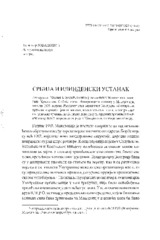Приказ основних података о документу
Serbia and the Ilinden uprising
Србија и Илинденски устанак
| dc.creator | Jovanović, Vladimir | |
| dc.date.accessioned | 2018-11-09T13:26:57Z | |
| dc.date.available | 2018-11-09T13:26:57Z | |
| dc.date.issued | 1998 | |
| dc.identifier.issn | 0350-7653 | |
| dc.identifier.uri | https://dais.sanu.ac.rs/123456789/4451 | |
| dc.description.abstract | The commotion in European Turkey in the first half of 1903 attracted the attention of Serbian politicians. However, preparations for the uprising in Macedonia coincided with a dynastic change in Serbia prompting Belgrade officials to give priority to internal issues. Besides, the attitude of the royal government was considerably influenced by the Great Powers and their active attempts at calming down tensions in the Balkans. In such circumstances, Belgrade's official attitude towards the occurrences in Macedonia was unambiguous. In keeping with the existing plan concerning the national question and in order to maintain good relations with the Ottoman Empire, Serbian politicians were determined to restrain from being involved in the complex situation caused by the uprising. Such decisions were largely influenced by the opinion of the competent circles in Belgrade that the uprising in Macedonia was stirred and supported by the Principality of Bulgaria and that, consequently, it was up to the politicians in Sofia to think about the possible consequences. In contrast with this reserved position of the officials, the fierceness of the events in Macedonia aroused turbulent and, in a sense, twofold reactions of various social circles and groups. The Serbian public, as could be heard in daily press and public statements, asked for a more active approach of the Serbian government above all, in terms of humanitarian aid to the Christians in the affected regions. On the other hand, uneasy about the passive attitude of official Belgrade, certain military circles displayed determination to protect Serbian interests in the south by implementing new forms of struggle. They set therefore, to muster up the first combat units despite the fact that Belgrade was expressly against Serbia's involvement in the armed conflict on the Macedonian soil. Such events, manifest exactly during the Ilinden uprising clearly indicated that the following period would witness a change in the general policy of the Kingdom of Serbia towards the Macedonian question and its adjustment to the new situation. | en |
| dc.description.abstract | Članak je posvećen odnosu različitih političkih činilaca Kraljevine Srbije prema Ilindenskom ustanku u Makedoniji, avgusta 1903. godine. Različit stav zvaničnog Beograda, oficirskih krugova i srpskog javnog mnjenja, prema ustanku, kao i zaoštravanje političkih prilika na Balkanu, doveli su do krupnih promena u postavkama srpskog nacionalnog rada u Makedoniji,u narednom periodu. | sr |
| dc.rights | openAccess | |
| dc.rights.uri | https://creativecommons.org/licenses/by-nc-nd/4.0/ | |
| dc.source | Balcanica | |
| dc.title | Serbia and the Ilinden uprising | en |
| dc.title | Србија и Илинденски устанак | sr |
| dc.type | article | |
| dc.rights.license | BY-NC-ND | |
| dcterms.abstract | Јовановић, Владимир; Srbija i Ilindenski ustanak; | |
| dc.citation.spage | 189 | |
| dc.citation.epage | 207 | |
| dc.citation.issue | 29 | |
| dc.type.version | publishedVersion | en |
| dc.identifier.fulltext | https://dais.sanu.ac.rs/bitstream/id/21409/4562.pdf | |
| dc.citation.other | (29): 189-207 | |
| dc.identifier.rcub | https://hdl.handle.net/21.15107/rcub_dais_4451 |

